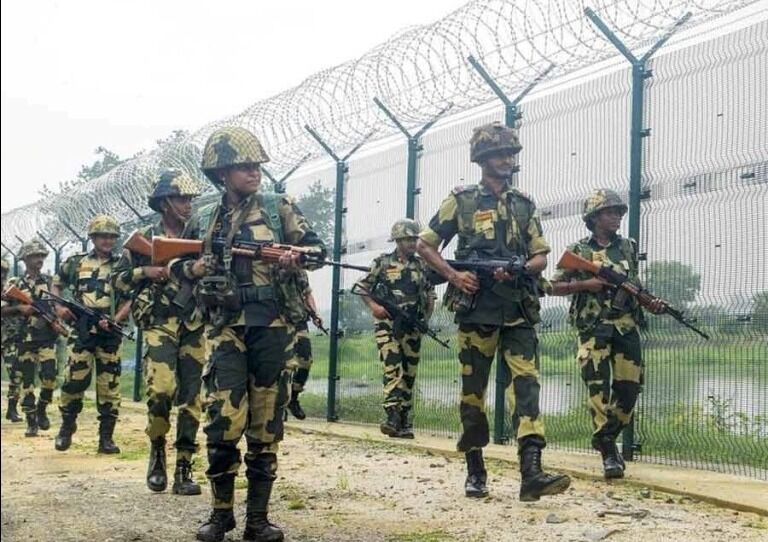In a significant move with deep geopolitical repercussions across South Asia, the Indian government has launched a high-intensity campaign to identify and deport illegal infiltrators from Bangladesh and Myanmar within 30 days—a directive that has already begun to escalate tensions between New Delhi and Dhaka.
The Union Ministry of Home Affairs (MHA) has instructed all Indian states and union territories to expedite the identification and deportation of suspected Bangladeshi and Myanmarese nationals. For the first time, the Centre has imposed a rigid 30-day timeframe, empowering border forces like the BSF and Assam Rifles with extraordinary authority under national security laws to act swiftly.
Officials have termed the order “unprecedented,” noting that it bypasses the traditionally slow and bureaucratic verification process that often took months. This marks a drastic acceleration in India’s approach to internal security and border management, and observers see it as both a governance challenge and a politically calculated move.
The government’s crackdown is already underway. In Gujarat, over 6,000 individuals identified as suspected Bangladeshi infiltrators are being scrutinized. Recently, 78 fishermen were forcibly sent back across the Bangladesh border via Satkhira. Similar operations are being conducted in the northeastern state of Tripura, which shares a long, porous border with Bangladesh.
Diplomatic fallout: Dhaka pushes back
The aggressive deportation measures have drawn strong objections from the Bangladesh government. Dhaka lodged formal protests with New Delhi after reports emerged of BSF personnel attempting to push suspected infiltrators across the Brahmanbaria border near Tripura. According to Bangladeshi authorities, local villagers intervened, preventing BSF from completing the operation.
Bangladesh’s stance is that many of those being sent back have not been verified as Bangladeshi citizens, and that India’s unilateral deportation efforts violate diplomatic protocol. The government in Dhaka has accused New Delhi of failing to consult or coordinate through proper bilateral channels.
This latest episode of tension adds to an already uneasy relationship between India and Bangladesh. The two neighbours have long-standing disputes over issues such as: Border killings by Indian security forces, unresolved water-sharing agreements, particularly over the Teesta River, trade imbalances and transit rights and maritime access.
The deportation campaign has only deepened suspicions in Dhaka, with many seeing it as a reflection of India’s shifting posture from cooperation to coercion.
Analysts argue that this crackdown is not solely about national security but also about political messaging. With assembly elections due in West Bengal and Assam—both border states with significant Muslim populations—the BJP has once again revived the issue of illegal immigration.
The BJP has repeatedly accused the Trinamool Congress (TMC) and Congress of shielding infiltrators for vote-bank politics. By portraying itself as the only party committed to defending the country’s borders, the BJP is attempting to consolidate nationalist sentiment among voters.
Opposition questions Centre’s role in border management
The opposition has countered by questioning the Centre’s handling of border security. They point out that the BSF, which reports directly to the Union government, is responsible for preventing illegal entries. Any infiltration, therefore, is a reflection of central failure—not state negligence.
Critics also accuse the Modi government of undermining cooperative federalism by unilaterally imposing such directives without adequately involving state governments in the decision-making process.
The presence of Rohingya Muslims—who fled persecution in Myanmar and are now scattered across India—adds further complexity. India does not recognize the Rohingya as refugees, classifying them as illegal migrants. This position has drawn criticism from human rights advocates and added another layer of diplomatic sensitivity in India’s ties with both Myanmar and Bangladesh.
Balancing act: National security vs regional diplomacy
As India proceeds with its 30-day deportation campaign, it finds itself walking a diplomatic tightrope. The government’s effort to assert control over border security and illegal migration must now contend with the growing unease in Dhaka, and the risk of further destabilising already fragile regional ties.
The coming weeks will test New Delhi’s ability to strike a balance between hardline internal security policies, electoral imperatives, and the delicate framework of regional diplomacy in one of the world’s most volatile geopolitical arenas.


